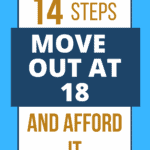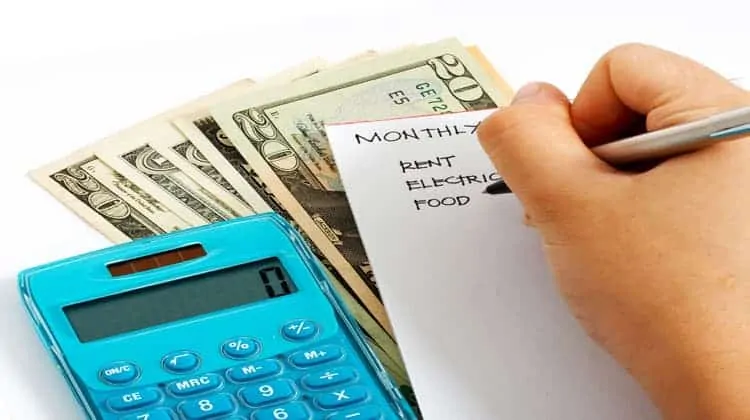THIS POST MAY CONTAIN AFFILIATE LINKS. PLEASE SEE MY DISCLOSURES FOR MORE INFORMATION
You’ve turned 18 and want to start living life on your own.
This is a great milestone, but you can destroy your future if you do it without thinking ahead first.
In this post, I will walk you through how to move out at 18 and afford it.
By following the steps below, you will be able to enjoy your own place and not ruin your financial future.
And if you follow the last few tips, you will end up with more money than you can imagine right now!
Table of Contents
14 Tips To Move Out At 10 And Afford It
#1. Have A Steady Income
The most important thing you need when looking for your first apartment is to first have a good job with a steady income.
In addition to rent payments, you will also have utilities, insurance, groceries, and other monthly expenses to pay for.
Without an income, you are going to find yourself broke fairly quickly.
While no job is guaranteed 100%, you should have an idea of how stable or reliable the income is.
If you are working a full time job, then you can assume you have a stable income.
But if you are just working odd jobs here and there, you are better served to wait and find a regular job first.
#2. Open Bank Accounts
Once you have a job, you will need a bank account.
I know you can go to Walmart and other places to cash your check, but having a checking account and savings account is critical to financial success.
Not just now, but for your future as well.
The more good money habits you can build now, the better off you will be down the road.
Most people choose to bank with a local bank or credit union.
This is fine for starters.
But if you are serious about being an adult, you should find higher interest yielding savings accounts.
These will help you money grow faster.
My favorite is CIT Bank.
They charge no fees and pay a good interest rate.
In the years I’ve used them, I’ve never had an issue.
To save you some time, below is a link to sign up online in minutes.
#3. Determine How Much Rent You Can Afford
The first step of research you should be doing before you move out of your parent’s house is to figure out how much rent you can afford.
This will be your biggest monthly expense, and it can have a huge impact on your finances.
Ideally, you want to keep this number at 30% of your gross income or lower.
Make sure you are doing the math based on your monthly gross and not your annual gross.
For example, if you are earning $40,000 a year, that comes to $3,333 a month.
Taking 30% of this gets you to $1,000 for rent.
If are paid hourly, you’ll need to convert your hourly wage into a monthly wage.
Luckily there are many options out there to make this simple, as opposed to doing the math.
For instance, if you want to know how much $15 an hour is annually, you can find out with a quick search.
Depending on where you live, finding a place to rent for $1,000 can be doable or impossible.
I’ll share some ideas to help you make rent more affordable shortly.
An important thing most first time renters overlook is the move in requirements when it comes to rent.
Most apartments require a security deposit to cover any damage that might happen while renting the unit.
This is damage above and beyond the normal wear and tear of daily life.
In addition to this, many landlords require first and last month’s rent to move in.
So if the place you are considering has monthly rent of $1,000 then you need $2,500 when you sign the lease.
This covers first and last month’s rent as well as the security deposit.
Of course, this is just a rough estimate since the security deposit varies.
The bottom line is, you need to have a decent amount of money saved up just to rent an apartment in the first place.
#4. Set Up A Realistic Budget
Working with a budget is probably not something you have ever done before.
So if this is your first time budgeting, don’t get overwhelmed.
It is a lot easier than many think and it’s not as bad as many think.
By using a monthly budget to estimate your income and expenses, you can lower the chances of digging yourself into a financial hole by going into debt.
So figure out what your monthly expenses will be.
You can get a friend who is living on their own to help with this, or ask your parents.
Another option to make this simple is to follow the 50/30/20 budget.
This budget has 50% of your income spent on needed living expenses.
This includes rent, utility services, food, transportation costs, cell phone, etc.
Then take 30% and use that for wants, or the things you don’t need in order to survive.
This includes cable, going out with friends, etc.
The final 20% is for debt and savings.
Hopefully the only debt you have is student loan debt and not high-interest debt like a credit card.
This category is for paying off any debt you have.
But also try to work in some extra money for building an emergency fund.
You never know when unexpected expenses will come up and having some money just is case is a smart thing to have.
To get more details about the 50/30/20 budget, click the link below.
With careful planning, you will know if you can afford an apartment or not before you make the financial commitment.
Maybe you need to save some more money or you definitely need a roommate to make moving out of your parents house a reality.
Whatever the case, do the planning first and you will be better off.
#5. Find A Place To Live
Before I talk about finding ways to make rent affordable, we need to talk about where to live.
You want to find a place that charges a reasonable rent and is in a decent part of town or the city.
You don’t want to live in the worst part of the city.
While you probably could afford the rental cost, there are other issues you have to worry about.
Namely, your personal safety, the safety of your visitors, and the safety of your belongings.
Because it is nearly impossible to account for these things, I suggest you look for an apartment in a safer part of the city, even though the rent will be higher.
As I said, you can’t put a price tag on not having to worry about your safety and the safety of your things.
#6. Affording An Apartment
Now, how can you afford an apartment?
There are a few things you can do.
The most popular option is to get a roommate.
Start off by talking to friends to see if they would be interested in moving in together and splitting the bills.
This is the ideal situation since you know them and can attest to their character.
If you don’t have a close friend looking to for a place to rent, ask them if they have friends.
If this option fails, you can find someone you don’t know.
But use caution here.
While you might agree to split the rent and utilities, if they stop paying or move out, you are on the hook for everything.
This is why it is tough to find a roommate that you don’t know.
If you do go this route, make sure you meet with them ahead of time to talk.
Try to get a feel for who they are and if they seem trustworthy.
This won’t protect you 100% of the time, but it can help.
Finally, you could consider buying a house.
With this example, you buy a duplex and live in one half and rent out the other.
Ideally the rent will cover most or all of your mortgage payment.
The downside is if you can’t find a renter, you are on the hook for the entire amount.
#7. Keep Food Costs To A Minimum
Now we get into the living expenses of life on your own.
One of the largest expenses in your budget is your food costs.
The lower you keep these bills, the more money you have for other things.
For example, if you are willing to sacrifice and eat ramen noodles or peanut butter and jelly sandwiches, you might be able to put a little more money towards a rent payment.
This could allow you to skip having a roommate at all.
Below are some great posts to help you keep your food costs low.
- Related: Click here to learn how to grocery shop
- Related: Learn the best places to eat out for cheap
- Related: Learn frugal meal planning tips to save money
Finally, try to eat out at restaurants as little as possible.
Your money will go a lot further when you eat in and cook at home.
#8. Drive An Older Car
I know that once you start getting a paycheck, a shiny new car is what most people desire.
But buying a new car and getting an auto loan is going to give you another huge monthly bill.
This only makes trying to make ends meet that much harder.
So give up on the idea of a new car for now.
You don’t have to drive your current car forever.
Just make it a point to save a little money every month to put towards a car.
Then in a few years, you can buy a car and it won’t have as big of an impact on your finances.
#9. Get Renters Insurance
This moving out tip is critical, yet most people ignore it.
When you are living at home, your parents have home insurance that protects all of the belongings in the house, including yours.
When you move out, their insurance no longer covers your stuff.
And the landlord’s insurance only covers the building, not your belongings.
So if a fire destroys your apartment and everything in it, you are out of luck.
You just lost everything.
Unless you have renter’s insurance.
It’s a simple policy that for $50,000 worth of stuff will cost you around $250 a year.
If you bundle it with your car insurance, you can get multi-policy discounts and lower the cost even more.
Gabi is a great resource to find the cheapest insurance rates.
In fact, they save users on average $950 a year when they switch!
Click the link below to see how much money you will save.
#10. Have Money In Savings
Another overlooked part of moving out is saving money.
Sure everyone has the idea of building wealth and buying a bigger house and having lots of nice things.
But if you don’t save any money, you will never be able to afford these things.
And worse, if you have no savings and an emergency comes about, like you suddenly lose your job, you are in financial trouble.
Therefore, you need to make saving money a habit.
Take 10% of your monthly income and put it into a savings account.
Don’t spend this money on anything.
Just set up a transfer and forget about it.
My favorite savings account is CIT Bank.
They pay a higher interest rate, so your money grows faster.
Click the link below to open your account today.
#11. Create A Second Income
It might sound silly to some of you to get a side hustle.
But having a second source of income is a huge advantage.
First, you aren’t taking the risk that so many other people do.
When you only have one source of income and you lose your job, how are you going to pay your bills and live?
You are going to have use savings, assuming you have any and find another job quickly.
This new job might pay less or have hours you don’t want, but you don’t have a choice.
You need the income.
You probably will go into debt as well, since there will be a period of time when you have no income but are still paying monthly bills.
But if you have a second income, this isn’t the case.
You still will have money coming in to help pay your bills.
This will allow you to be pickier when it comes to finding another main source of income.
Here is how having a second stream of income helped me.
I was doing OK financially and was working a regular job.
On the side, I started a website.
Fast forward 3 years and my site was earning $10,000 a year.
I didn’t need this money to live off of, so I was putting it into savings.
A few years later, I was laid off.
While it was stressful to have been laid off, I didn’t worry.
I had money coming in on the side and I had a healthy amount of money in savings.
As a result, I ended up not looking for another job and worked at turning my side gig into a full time income.
I gave myself 6 months to see if I could grow the income and I did.
It’s been 8 years now since this happened.
While you don’t have to turn your side job into your main job, the option is there.
#12. Learn How To Save Money
In addition to saving money, you need to learn how to save money.
Up until now, you probably didn’t think too much about saving money on things since you didn’t have monthly bills to pay.
But once you do, you will realize life is expensive.
That is unless you learn how to save.
The more you can cut costs and save money, the wider the gap you create between your income and your expenses.
The larger this gap, the more money you can save.
And the more money you can save, the faster you are going to get ahead.
In fact, at this point in your life, the amount you save is the most critical thing.
This is all because of compound interest.
The more time your savings has to grow, the more it will grow into.
For example, let’s say you commit to save $250 a month at age 18.
You put this money into a savings vehicle that earns you 5% interest.
By the time you are 30 years old, you have over $50,000!
This could be used for a down payment on a house or any other savings goal you have.
So what are some creative ways to save money?
- Related: Discover over 75 ways to save money
You can skip name brand clothing and instead opt for off label brands.
Or you could shop at second hand stores or thrift stores to save money.
Can you find ways to get free stuff?
Can you find basic things you need at a dollar store to cut costs?
What about buying some store brand items instead of name brands at discount stores?
Finally, look at the various apartment options you have.
If apartment complexes offer a free gym and other free amenities, a higher monthly rent might make sense if it is lower than the monthly cost of the services alone.
The more creative you can be with saving money, the more enjoyment you will get out of it, and as a result, the more money you will save.
#13. Learn How To Invest
Related to the point above about learning how to save, you need to learn how to invest.
Or at the very least start investing now.
The same idea applies as above, but the results are even more dramatic since you earn a higher rate of return on your invested money.
Let’s take the same example from above.
You invest $250 a month at age 18 and earn 8% return.
By the time you are 30 years old, you have over $61,000. 60485
If you keep investing until retirement at 65, you have over $1.4 million dollars.
Now let’s say you wait until you are 25 to start investing.
You invest the same $250 a month and earn the same 8%.
When you turn 30 you have roughly $19,000 and at age 65 you have $839,000.
By waiting 7 years to invest, you cost yourself $42,000 at age 30 and over $500,000 at retirement!
The bottom line is, the sooner you start to invest the better.
As for where to start investing, I prefer Acorns.
You can invest as little as $5 a month and you can invest your spare change.
It might not sound like this is worth it, but it is.
In one year of just investing my spare change I had close to $1,000!
Click the link below to start investing with Acorns and get $5 for free!
#14. Get Your Priorities Straight
Finally, you need to get your priorities straight.
This isn’t to say you can’t have fun now and blow money on a long weekend in Vegas.
In fact, I encourage you to do this.
After all, you only get one life and you need to enjoy it.
But you need to do it without going into debt and destroying your future.
Because of this, you need to be more aware of your spending.
Take some time to understand what you enjoy in life.
If you love the idea of weekend getaways with your friends and having a new car doesn’t matter to you, then keep driving your old car.
Don’t think you need a new car as a sign you are making it in this world.
Likewise, if eating out at restaurants doesn’t make you happy, then don’t spend your money there.
What I am trying to tell you is to spend your money in places and on things that make you happy.
If something doesn’t bring you enjoyment, then stop spending money on those things, or at least reduce it so you can spend money in other areas that are important to you.
Wrapping Up
It is possible to move out at 18 and afford it.
Many people do it every day.
But many people don’t take the proper steps to ensure they have enough money to truly afford it.
As a result they end up putting expenses on credit cards and building up a massive pile of debt.
Now they can’t save money to get ahead and have the added stress of trying to make ends meet every single month.
You don’t want to live life this way.
It’s not a fun life to live.
By taking the time to first assess your financial situation and being smart about your finances, you can move out and not have the stress around money that so many other people do.
This will allow you to build wealth over time and create more options and opportunities in life.








